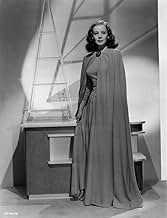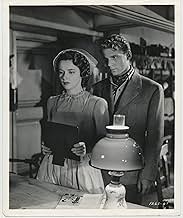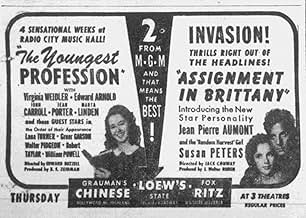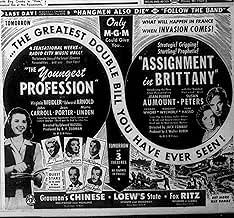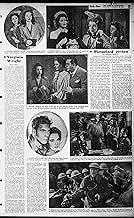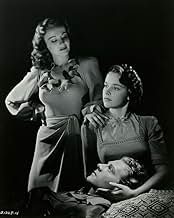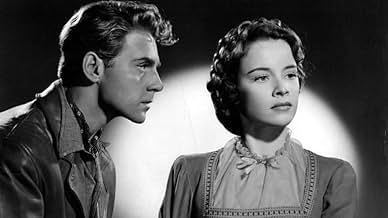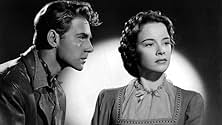Añade un argumento en tu idiomaA French captain (Jean-Pierre Aumont) poses as a Nazi to pinpoint a U-boat base off the coast of France, while assuming the identity of a look-a-like French citizen.A French captain (Jean-Pierre Aumont) poses as a Nazi to pinpoint a U-boat base off the coast of France, while assuming the identity of a look-a-like French citizen.A French captain (Jean-Pierre Aumont) poses as a Nazi to pinpoint a U-boat base off the coast of France, while assuming the identity of a look-a-like French citizen.
- Dirección
- Guión
- Reparto principal
Jean-Pierre Aumont
- Bertrand Corlay
- (as Pierre Aumont)
- …
Reseñas destacadas
This is a Hollywood movie made in the middle of World War II. It's a very good portrayal of British and French undercover work during the war, as well as of the French underground. To its credit, it also shows the betrayal of some of the French, including a double agent and traitors among the underground.
The French underground contributed to the Allied efforts against Germany in WW II. But the country also saw a significant collaboration with the Nazis, in the Vichy government, socializing with the Germans, and spies and double agents in the underground.
At the time "Assignment in Brittany" was being made, Germany's blockade of the Atlantic was in place. By the end of 1943, when it had ended - due to loss of ships and air support, the Germans had sunk 3,500 merchant ships enroute to the United Kingdom and Russia. Some 175 Allied war ships also had been sunk. Germany lost 783 U-boats and 47 surface ships.
There wasn't a specific U-boat base on the coast of France that had to be knocked out, as this movie shows. Rather, Allied bombing raids hit several ports from which U-boats operated. But, most of the U-boat losses were from Allied aircraft and convoy escort ships. The Atlantic battle was one of attrition in which the Allies outlasted the Germans with superior naval power combined with a blockade of Germany from its Baltic Sea ports.
This film has some good action toward the end. But its best aspect is the portrayal of the French underground and people during the German occupation. The story is an interesting one. Considering that MGM had to shoot the movie on its Hollywood studios, the film has a realistic feel as though it's taking place in Brittany France during the war.
The cast all do a fine job and the film quality and production are good. This was the American film debut of both Jean-Pierre Aumont and Signe Hasso. He is Capt. Pierre Metard in the French Army, and goes undercover back into France as a look-alike, Bertrand Corlay. His duty is to pinpoint the hidden German U-boat base so that the Allies can attack and destroy it. The story has an element of romance, but not the obviously usual type that Hollywood inserts to increase appeal for a film.
Here are a couple of interesting lines from the movie. Corlay and a schoolteacher, Jean Kerenor (played by Richard Whorf) are going into the town pub when a German guard stops them. Kerenor says, "One uncovers. It's good form for the content." They take their hats off and enter, where town men and German officers are seated at tables. But all others are wearing their hats.
To Metard, who impersonates her son, Madame Henriette Corlay says, "There are women, monsieur, who give their love but once. I think Ann's one of them. When you go..." Capt. Metard, "It's not I she loves... it's your son." Mme. Corlay, "I don't think you believe that. Monsieur, don't make her suffer any more."
The French underground contributed to the Allied efforts against Germany in WW II. But the country also saw a significant collaboration with the Nazis, in the Vichy government, socializing with the Germans, and spies and double agents in the underground.
At the time "Assignment in Brittany" was being made, Germany's blockade of the Atlantic was in place. By the end of 1943, when it had ended - due to loss of ships and air support, the Germans had sunk 3,500 merchant ships enroute to the United Kingdom and Russia. Some 175 Allied war ships also had been sunk. Germany lost 783 U-boats and 47 surface ships.
There wasn't a specific U-boat base on the coast of France that had to be knocked out, as this movie shows. Rather, Allied bombing raids hit several ports from which U-boats operated. But, most of the U-boat losses were from Allied aircraft and convoy escort ships. The Atlantic battle was one of attrition in which the Allies outlasted the Germans with superior naval power combined with a blockade of Germany from its Baltic Sea ports.
This film has some good action toward the end. But its best aspect is the portrayal of the French underground and people during the German occupation. The story is an interesting one. Considering that MGM had to shoot the movie on its Hollywood studios, the film has a realistic feel as though it's taking place in Brittany France during the war.
The cast all do a fine job and the film quality and production are good. This was the American film debut of both Jean-Pierre Aumont and Signe Hasso. He is Capt. Pierre Metard in the French Army, and goes undercover back into France as a look-alike, Bertrand Corlay. His duty is to pinpoint the hidden German U-boat base so that the Allies can attack and destroy it. The story has an element of romance, but not the obviously usual type that Hollywood inserts to increase appeal for a film.
Here are a couple of interesting lines from the movie. Corlay and a schoolteacher, Jean Kerenor (played by Richard Whorf) are going into the town pub when a German guard stops them. Kerenor says, "One uncovers. It's good form for the content." They take their hats off and enter, where town men and German officers are seated at tables. But all others are wearing their hats.
To Metard, who impersonates her son, Madame Henriette Corlay says, "There are women, monsieur, who give their love but once. I think Ann's one of them. When you go..." Capt. Metard, "It's not I she loves... it's your son." Mme. Corlay, "I don't think you believe that. Monsieur, don't make her suffer any more."
This is a wartime film obviously intended to bolster the public's resolve. It stars a French expatriate, Jean-Pierre Aumont, who came to Hollywood when his country fell to the Germans. Unfortunately, not too many other French actors were available...and those who SHOULD have had French accents never even tried. So, it's all a bit strange with Aumont the only French person in a film set in a France where everyone has American and British accents!! Just suspend your sense of disbelief and watch.
The story is a bit silly but enjoyable. It seems that a French agent cannot go back to his native land for an assignment due to an injury. But, they manage to find a Free-French officer, Pierre (Aumont) who looks a lot like him. And, after a bit of plastic surgery, voila...the man has a double who will do the assignment for him! His job is to locate the secret German submarine bases so they can be destroyed. And, until he locates them, Pierre is to assume the other man's life...living withe man's mother and interacting with his friends.
The story that follows is rather typical of a wartime film. However, the Germans are not quite as monstrous as they often were in WWII- era films--as the filmmakers were going more for realism in this instance. Overall, it's enjoyable but a tad dumb. Turn off the part of your brain that questions silly plot lines and you'll no doubt enjoy this generally well made film.
The story is a bit silly but enjoyable. It seems that a French agent cannot go back to his native land for an assignment due to an injury. But, they manage to find a Free-French officer, Pierre (Aumont) who looks a lot like him. And, after a bit of plastic surgery, voila...the man has a double who will do the assignment for him! His job is to locate the secret German submarine bases so they can be destroyed. And, until he locates them, Pierre is to assume the other man's life...living withe man's mother and interacting with his friends.
The story that follows is rather typical of a wartime film. However, the Germans are not quite as monstrous as they often were in WWII- era films--as the filmmakers were going more for realism in this instance. Overall, it's enjoyable but a tad dumb. Turn off the part of your brain that questions silly plot lines and you'll no doubt enjoy this generally well made film.
10mutti-2
This is a story of the remarkable resemblance of two French men during WW II: one of whom is dealing traitorously with the Nazi occupation, and the other who is sent by British intelligence to try to discover the location of a Nazi port in Brittany that is destroying English ships. Both the mother and the sweetheart of Bertrand (the first man) are very disappointed with his activities and find it hard to believe in the goodness of Pierre, who is impersonating him, and are slow to accept the deception. Complicating the plot is Bertrand's mistress whose existence is unknown to Pierre. How the location of the Nazi port is discovered and the double-identity is resolved form a thrilling development.
Solid story, I think well done and paced nicely for modern sensibilities even. Dramatic scenes jump to quite harrowing action without warning, and play out realistically. A relatively simple, high-stakes spy/war plot, clearly resolved. Nice bits of play acting, being discovered, double agents, etc. etc.
Some here complain about the acting, but I thought it all worked great, and the supporting cast really held up their end; even people on screen for two minutes seem real, and to be motivated by actual emotion.
Not a great transfer, and hard to watch but I caught it on TCM. Nicely done sets, and mostly works within the confines of budget by keeping things indoors and at night. The few outdoor scenes (especially those in the day) are a bit lame in the backlot/studio way they were, but that's about the only flaw I can find in it.
Some here complain about the acting, but I thought it all worked great, and the supporting cast really held up their end; even people on screen for two minutes seem real, and to be motivated by actual emotion.
Not a great transfer, and hard to watch but I caught it on TCM. Nicely done sets, and mostly works within the confines of budget by keeping things indoors and at night. The few outdoor scenes (especially those in the day) are a bit lame in the backlot/studio way they were, but that's about the only flaw I can find in it.
I can't remember the exact year, but my mother and I were invited to an evening at the Uptown Theatre in Toronto, Ontario for a special screening of Assignment in Brittany in aid of the Free French movement. It was a very exciting time for me, and Jean Pierre Aumont was there in person. I was 14 or 15 at the time, and I have never forgot the evening. Our tickets were a gift from a french teacher at the Cental High School of Commerce. It was a gala evening, in spite of the fact that war was raging in Europe and the Pacific. I was of an age when I was entranced by movie stars, and to see Mr. Aumont in person was a dream come true.
I wonder if there are others who attended that show. Mr. Aumont was introduced, and spoke at length about the Free French movement, and encouraged donations to support them. I enjoyed the picture very much, as did my mother. There was a reception after the screening, where we were introduced to Mr. Aumont, a very gracious man. Perhaps it was the fact that the war had been on for it seemed forever, and the picture showed what ordinary citizens could do to help defeat the enemy. Certainly, although we did not suffer the devastation of actually being occupied or bombed, we were well aware of the loss of our dear family and friends. There were many films made about the war but this seemed special because of the appearance of people who had direct connection with the Free French movement, and we were hearing about it first hand.
I wonder if there are others who attended that show. Mr. Aumont was introduced, and spoke at length about the Free French movement, and encouraged donations to support them. I enjoyed the picture very much, as did my mother. There was a reception after the screening, where we were introduced to Mr. Aumont, a very gracious man. Perhaps it was the fact that the war had been on for it seemed forever, and the picture showed what ordinary citizens could do to help defeat the enemy. Certainly, although we did not suffer the devastation of actually being occupied or bombed, we were well aware of the loss of our dear family and friends. There were many films made about the war but this seemed special because of the appearance of people who had direct connection with the Free French movement, and we were hearing about it first hand.
¿Sabías que...?
- CuriosidadesThe Germans built several submarine bases on the west coast of France after their occupation of the country in 1940. Enormous submarine pens of reinforced concrete were erected at Bordeaux, Brest, La Pallice, Lorient and Saint-Nazaire. These structures protected the U-Boats from attack and allowed them freer access to the Atlantic Ocean, as the submarines did not have to transverse the English Channel or go around the UK via the North Sea from bases in Germany. As of 2020 these massive constructions are still largely intact and some have even been re-purposed. The pens at La Pallice can be seen in El submarino (Das Boot) (1981) and En busca del arca perdida (1981).
- PifiasAs Corlay and Kerenor are about to enter the pub, a German guard stops them. Kerenor says, "One uncovers. It's good form for the content." They take their hats off and enter. But once inside, only they have their hats off. All the other Frenchmen of the town, and the German officers, have their hats on their heads.
- Citas
Jean Kerenor: [as he and Metard/Corlay are stopped by a guard from entering a pub] One uncovers. It's good form for the content.
[German officers as well as town folk are seated inside]
Selecciones populares
Inicia sesión para calificar y añadir a tu lista para recibir recomendaciones personalizadas
Detalles
- Duración1 hora 36 minutos
- Color
- Relación de aspecto
- 1.37 : 1
Contribuir a esta página
Sugerir un cambio o añadir el contenido que falta

Principal laguna de datos
What is the Spanish language plot outline for Assignment in Brittany (1943)?
Responde
